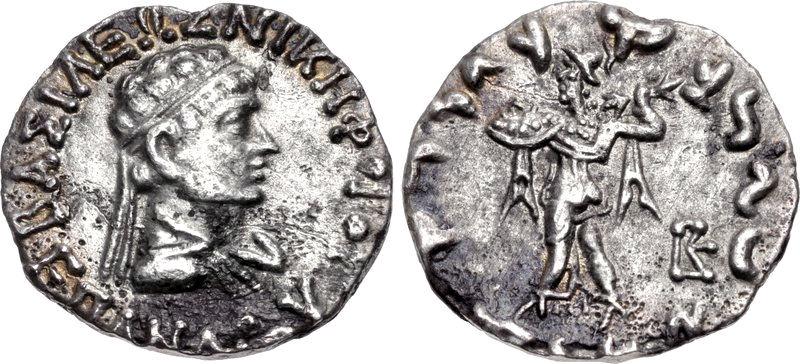Epander on:
[Wikipedia]
[Google]
[Amazon]


 Epander (
Epander (
Coins of EpanderLe Roi Epandre le Victorieux
{{Hellenistic rulers Indo-Greek kings 1st-century BC rulers in Asia


 Epander (
Epander (Greek
Greek may refer to:
Greece
Anything of, from, or related to Greece, a country in Southern Europe:
*Greeks, an ethnic group.
*Greek language, a branch of the Indo-European language family.
**Proto-Greek language, the assumed last common ancestor ...
: ) was one of the Indo-Greek
The Indo-Greek Kingdom, or Graeco-Indian Kingdom, also known historically as the Yavana Kingdom (Yavanarajya), was a Hellenistic-era Greek kingdom covering various parts of Afghanistan and the northwestern regions of the Indian subcontinent ( ...
kings. He may have been a relative of Menander I
Menander I Soter ( grc, Μένανδρος Σωτήρ, Ménandros Sōtḗr, Menander the Saviour; pi, मिलिन्दो, Milinda), was a Greco-Bactrian and later Indo-Greek King (reigned c.165/155Bopearachchi (1998) and (1991), respectivel ...
, and the findplaces of his coins seem to indicate that he ruled in the area of Punjab
Punjab (; Punjabi: پنجاب ; ਪੰਜਾਬ ; ; also romanised as ''Panjāb'' or ''Panj-Āb'') is a geopolitical, cultural, and historical region in South Asia, specifically in the northern part of the Indian subcontinent, comprising a ...
.
Time of reign
Bopearachchi dates Epander to c. 95–90 BC and R. C. Senior to c. 80 BC. The scarcity of his coins indicate that his reign was short and/or his territory limited.Coins of Epander
Epander's silver drachms portray the king indiadem
A diadem is a type of crown, specifically an ornamental headband worn by monarchs and others as a badge of royalty.
Overview
The word derives from the Greek διάδημα ''diádēma'', "band" or "fillet", from διαδέω ''diadéō'', " ...
with a reverse of Athena
Athena or Athene, often given the epithet Pallas, is an ancient Greek religion, ancient Greek goddess associated with wisdom, warfare, and handicraft who was later syncretism, syncretized with the Roman goddess Minerva. Athena was regarded ...
fighting which was the type of Menander I. Epander probably claimed ancestry from this important king, but his epithet ''Nikephoros'' (Victorious) was unique to kings using this reverse: their title was usually ''Soter'' (Saviour). He struck no Attic (monolingual) coins.
Overstrikes
Epander overstruck coins ofStrato I
Straton or Strato may refer to:
* Strato I, Indo-Greek king
* Strato II, Indo-Greek king
* Strato of Lampsacus (c. 335 – c. 269 BC), Greek philosopher
* Straton of Sardis, Greek poet and anthologist
* Abdashtart I (Straton I, 365–352 BC), king ...
and Philoxenus.
See also
* Greco-Bactrian Kingdom * Seleucid Empire *Greco-Buddhism
Greco-Buddhism, or Graeco-Buddhism, is the cultural syncretism between Hellenistic culture and Buddhism, which developed between the fourth century BC and the fifth century AD in Gandhara, in present-day north-western Pakistan and parts of nort ...
* Indo-Scythians
Indo-Scythians (also called Indo-Sakas) were a group of nomadic Iranian peoples of Scythian origin who migrated from Central Asia southward into modern day Pakistan and Northwestern India from the middle of the 2nd century BCE to the 4th centu ...
* Indo-Parthian Kingdom
The Indo-Parthian Kingdom was a Parthian kingdom founded by Gondophares, and active from 19 CE to c. 226 CE. At their zenith, they ruled an area covering parts of eastern Iran, various parts of Afghanistan and the northwest regions of the Indian s ...
* Kushan Empire
References
* ''The Greeks in Bactria and India'', W.W. Tarn, Cambridge University Press.External links
Coins of Epander
{{Hellenistic rulers Indo-Greek kings 1st-century BC rulers in Asia